
Participants in the Communication workshop post their selfies to the ExtendEd portal.
How does an educator convene a global classroom across a dozen countries, numerous cultures and differing perspectives? Sometimes, it’s better to instead let the students set the pace.
WDI’s Education Sector team recently tailored two fully online courses for The Ford Motor Company Fund as part of the Ford Community Impact Fellows Training program. Students accepted into the program work together to advance understanding and new thinking around topics such as innovation and entrepreneurship.
The courses were tailored to the students’ needs by key personnel at WDI’s Global Virtual Learning Center (GVLC), which was established to advance the field to create international linkages and promote economic growth in emerging markets. Students hailed from a dozen countries including Brazil, Ghana, Kenya, Mexico, Morocco and Sierra Leone.
“In this day and age, we all need to be continuous learners,” said Amy Gillett, vice president of the Education sector. “In a time when it’s difficult or impossible to bring people together face to face, this format is really effective and it also sets students up for making long-term connections with one another.”
The two fully online courses include one module on developing leadership qualities and a second on improving interpersonal communication skills. About 130 students participated in the leadership module, offered for seven weeks ending April 11, and 179 students are taking part in the five-week communications module, set to end July 12. The leadership course helped participants understand themselves as leaders on both personal and team levels, and drew on the Michigan Model of Leadership. The communications course emphasized cross-cultural communication, managing emotions and interpreting body language across different nationalities and traditions.
WDI produced the content for the courses, which were hosted on the ExtendEd portal – the Institute’s proprietary learning management system. Students viewed a series of instructional videos on ExtendEd, followed by quizzes to check for comprehension. Students were assigned to teams across countries to work on a project together and practice their new leadership skills.
While the students were from many different countries, pursuing a wide variety of degrees and occupations – from business to medicine – a well-designed online learning environment was a perfect vehicle for bringing them together.
“It’s an efficient way to reach people with targeted training, and it’s the way people prefer to learn,” said Gillett. “They want to learn when they have time to learn, even if it’s in 15-minute increments. Students log in at their own pace, learn at their own pace, and take the modules on any device.”
The course is a perfect example of a small private online community – or SPOC – which is designed to nurture an intimate learning environment where students can interact and get to know one another other.
At the conclusion of the modules, WDI hosts a live webinar to summarize the learning. This is followed by sending participants a series of reminders on what they learned in the course. Such reminders — “Memory Pings” — also prompt them to apply what they learn in the course back on the job.
“It’s vitally important to provide opportunities for tomorrow’s leaders to share new ideas and brainstorm sustainable solutions to make people’s lives better,” said Farah Harb, Global Education Programs Analyst, Ford Motor Company Fund. “Learning and leadership are essential as we navigate and adapt to our constantly changing world.”
Many students found the WDI courses very valuable.
“Giving back to society and creating positive (impact) has always been my passion. In the world, there are so many challenges facing us,” … to fix these problems, the world needs great leaders with great leadership skills and this course has shown me surely that great leaders can be created or trained,“ wrote one student of the Leadership workshop.
Another student noted: “This workshop has been an eye opener and I am certain I am ready to work in every environment.”
As a final assignment, the students submitted videos exploring cross-cultural learning and how to apply that knowledge to real-world scenarios. The finalists for the contest and their video stories, can be found below:
This student project framed a comprehensive strategy for ultrasound training, deployment and business modeling at 1200-bed Komfo Anokye Teaching Hospital in Kumasi, Ghana.
WDI created an 8-week online course: Starting a Business: Your Entrepreneurial Journey. The pilot program ran in April-May 2023. The course consisted of live training sessions, guest talks, short videos, online quizzes, and a capstone project in which participants worked in teams to conceptualize and pitch a new business via a video. The video was then judged by the program mentors and winning teams received a special certificate. The pilot program had 88 participants from nine countries.
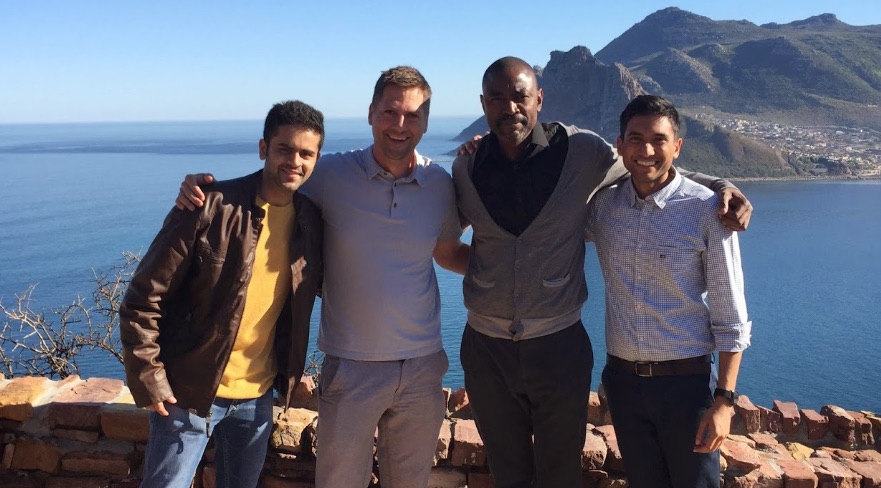
Puneet Goenka, far right, with his PATH colleagues in South Africa.
Note: This is one in an ongoing series of articles profiling past WDI interns and Multidisciplinary Action Project (MAP) team members and their career paths. Additional profiles in the series may be found here.
Puneet Goenka always wanted a career in which he could improve people’s lives.
As an undergrad at the University of Michigan, he studied cell biology with an eye on the medical profession. Then he heard a talk by Partners In Health Co-founder Dr. Paul Farmer who said even though life-saving drugs were readily available around the globe, it might take years to get them to those in need. Goenka said he realized just researching a life-saving drug wasn’t enough.
After graduation, he worked for a manufacturing company in Chicago on its health, safety and sustainability team. He later moved to India for a consulting job and then founded a start-up enterprise. Throughout all these career changes, Goenka became more determined to work in the development sector.

While I knew it would serve as a useful resource, I did not realize just how helpful the Institute would be until I got to Ross and started interacting with the staff and professors associated with WDI.
—Puneet Goenka, Senior Consultant FSG
He chose U-M’s Ross School of Business for his MBA studies in part because of WDI’s student-focused programs. One of those programs, the WDI Global Impact Internship program, would help Goenka “cement his commitment” to a life working in the development sector. And when he was looking at graduate schools, WDI’s programs struck him as a great resource for MBA students.
“While I knew it would serve as a useful resource, I did not realize just how helpful the Institute would be until I got to Ross and started interacting with the staff and professors associated with WDI,” he said.
While at Ross, Goenka said that an off-campus internship search—more typical in the development sector—was challenging at first, but connections and resources provided by WDI made things easier for him, especially the summer internships offered by WDI.
“…That itself was a huge help for someone who was navigating the development sector for the first time,” he said. “I remember having a hard time narrowing down exactly which internship projects I wanted to apply to because each one was exciting. Finally, I decided to apply to projects that would allow me to work in the healthcare space—something I had wanted to do growing up but never really got the chance to—in a country that I had no prior experience in.”
Goenka worked with the Seattle-based global health nonprofit PATH to develop a market entry strategy for a low-cost medical device in three countries—South Africa, Ghana and Uganda. For his internship, Goenka researched the regulatory environment, mapped the current landscape of comparable products, studied customer needs and usage patterns, estimated demand and recommended context-appropriate pricing.
Goenka said never having worked in those three countries and never with medical devices made him both “nervous and excited.” But he learned a lot, he said. He developed a financial model by himself for the first time: “a skillset that continues to be useful to this day.” He also learned how to navigate the different business cultures in each country.
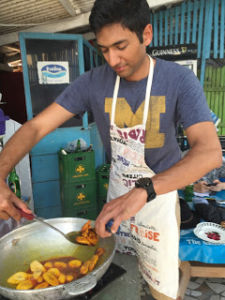
Goenka learning to cook Ghanian food.
For instance, Ghana’s business culture was “relationship-based,” where simply being polite and friendly opened doors to get interviews with relevant stakeholders at national hospitals. Uganda was more process-driven, he said, and required formal letters in order to meet with officials. Goenka would later be sent to Uganda for his current job and said his experience there as an intern gave him more confidence in conducting research this time around.
“The internship with PATH cemented my commitment to developing a full-time career in the development sector,” he said. “The work was challenging; I was working alongside driven and smart colleagues and the impact potential of the work was high. These were all important factors for me and I saw them coming alive while at PATH, which gave me confidence that I would enjoy working in the development sector.”
Goenka now leads case teams as a senior consultant for FSG in India. FSG is a consulting company that finds business solutions to social challenges. After working on an early education project for nearly two years, he is currently working on a project in Uganda to provide households with better sanitation facilities. But instead of just building and providing toilets for free, his project looks to stimulate the market so households can invest in and buy their own toilets, and the private sector is better equipped to provide customer-appropriate toilets.
“This work is a perfect way for me to blend my business training and experience with my interest in the development sector,” he said.
For now, Goenka is content working and living in India, but is open to moving elsewhere if the right opportunity came along.
“I’ve been fortunate to have worked in the U.S., India, and a little in South Africa, Ghana, and Uganda—thanks to PATH and WDI—and that makes me feel better equipped to work in new and unfamiliar geographies and contexts,” he said. “However, irrespective of geography and sector, I am quite sure that I will continue to work in the development sector, trying to improve people’s lives.”
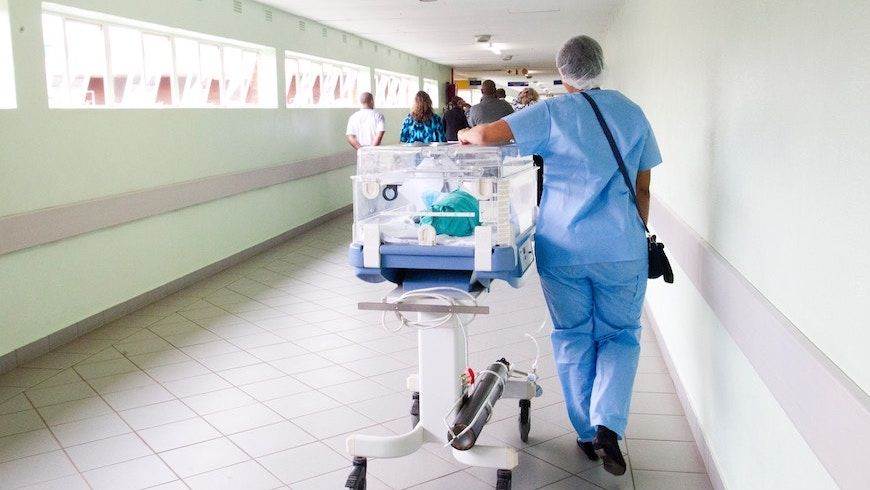
Note: The following post was originally published on NextBillion.net, which is managed by WDI.
By Paul Clyde

Paul Clyde, President of WDI
This past summer, Ghana was selected as the host country for the Secretariat of the African Continental Free Trade Area (AfCFTA), a group of countries with a population of 1.3 billion and a combined income that rivals that of France. These 54 countries will allow free trade between them beginning in July 2020. No company can afford to ignore this market or, more generally, any low- and middle-income country (LMIC). This is especially true for health care companies.
LMIC markets, as categorized by the World Bank, are already large – and they are growing at a much faster pace than high-income countries (HICs). According to the World Bank, total health care expenditures in LMICs were 11% of total health care expenditures in HICs in 2000. By 2015 that percentage had jumped to 25%.[1] And this understates the change. Twenty countries moved from LMIC to HIC between 2000 and 2015 and were therefore counted in the total health care expenditures for LMICs in 2000, but not in 2015. No countries moved from high income to low or middle income over the same period. If we keep the countries that were in the LMIC category in 2000 in the calculation for 2015, the total health care expenditures for LMICs were 29% of 2015 total health care expenditures in high-income countries. Put differently, while HIC health care expenditures were growing at a fast pace at the beginning of the century, LMIC health care expenditures were growing almost three times as fast, according to World Bank data.
The LMIC data described above lump middle-income countries with low-income countries, so it is tempting to think the growth is coming completely from the middle-income countries. This would be a mistake. Since 2000, 33 countries moved from a low-income country classification to middle income. LMIC income levels and health care expenditures are growing at an increasing rate. It is no longer safe for businesses to assume that operations in low-income countries will not be profitable 10 or even five years from now.
Despite the current size and growth rates of these economies, it is not clear if today’s leading companies will be able to serve them. Take the example of Denver-based DaVita, one of the largest providers of dialysis treatments in the world. In 2018, it pulled out of India – despite the fact that India is already the second largest diabetes market in the world, and is expected to become the largest soon. (Diabetes is a leading cause of chronic kidney disease.) DaVita sold its operations in India to NephroPlus, the largest chain of dialysis centers in India. Headquartered in Hyderabad, NephroPlus is raising capital to enter the Middle East and Southeast Asia, capitalizing on the growth opportunities in emerging markets.
It isn’t really a question of whether or not businesses will end up serving today’s low- and middle-income countries as a major part of their portfolio. The question is only which businesses will do it.
—Paul Clyde, President of WDI
This last point raises the stakes. Many companies, regardless of where they are based, will try to take advantage of the opportunities in LMICs, and while it will be challenging, some will succeed. Those that do can eventually be expected to turn their attention to HICs. Entering HICs may require changing their processes or products, and not all will succeed in this step either. But even if only a handful succeed, the competition will be meaningful. Neglect of LMICs today isn’t just a lost opportunity in those markets. It could also spawn competitors in HICs – competitors who, by the time they reach those markets, have a well-honed service or product that is particularly dangerous to incumbent firms.
The task facing today’s leading companies can be met, and doesn’t require drastic innovations – relatively modest modifications to business processes will often be sufficient. Consider, for example, Brook Fekadu, who became a licensed dealer of GE equipment in Ethiopia about five years ago. A major challenge with imaging equipment is its installation, maintenance and servicing. Fekadu trained his staff to provide those services up to GE’s standards. He also purchased equipment himself, and provides diagnostic services to individual patients. Hospitals that don’t have the volume to support some of the expensive diagnostic equipment refer their patients to Fekadu for a diagnosis. Once the hospital develops the volume, he is happy to sell them the equipment and service it. It is an extremely effective business model that can be expected to be repeated in other countries. GE or any other company can use it to expand their geographic reach into LMICs profitably.
It isn’t really a question of whether or not businesses will end up serving today’s low- and middle-income countries as a major part of their portfolio. The question is only which businesses will do it. It will require an investment – including short-term losses – before a return is realized, just as it did with the automobile companies serving China and India in the 1990s. Most of today’s global health care companies, some of which come from LMICs, are already making those investments. Not all will succeed. However, any company that is not making some investment in these markets is effectively ceding them to competitors or, perhaps more likely, entrants into the market, many of which will come from LMICs. And whoever does succeed in developing a business model that is profitable in LMICs has a huge, and growing, market to serve. They may also be able to take a significant share of the market in HICs from incumbents who have not been subjected to the same trials.
Finally, it is worth commenting on the social consequences of this discussion. Any company that succeeds in serving these markets will have done so by satisfying the local customers and hiring people to provide the good or service. The more successful the company is, the more customers will be satisfied and the more individuals will be employed. And that is just the beginning. Success provides the capital and incentive to grow further – something lacking in the absence of profits. We can’t know whether the company that will tap into these markets will be an existing multinational or an as-yet-unformed entrant. But we can be confident that the individuals in these economies will benefit as consumers, employees and/or owners of the companies that prevail.
[1] World Bank’s Health Nutrition and Population Statistics as accessed on August 20, 2019. Based on comparison of current health expenditures in current US dollars. Current US dollars were used instead of PPP because the discussion pertains to the market size for outside investors.
Paul Clyde is the president of WDI and the Tom Lantos Professor of Business Administration at the Ross School of Business at the University of Michigan.
Photo courtesy of Hush Naidoo.
WDI’s Healthcare Initiative has collaborated since early 2018 with physicians in Michigan Medicine’s NIH-funded Ghana Emergency Medicine Collaborative (GEMC) to improve emergency department (ED) operations, finances and clinical delivery. The sites include 1,200-bed Komfo Anokye Teaching Hospital (KATH) and 2,200-bed Korle Bu Teaching Hospital (KBTH) in Kumasi and Accra, respectively. MBA MAP teams have worked in each hospital in March-April 2018 (at KATH) and 2019 (at KBTH), with much recent work focusing on measuring the debilitating consequences of paper billing and payments (called “cash & carry”) that are presently made by patients exclusively in hard currency.
WDI has introduced simple tools at each hospital to track patient flows (e.g., a daily ED census), measure payments-related delays, seek to establish sustainable business processes and identify root causes of operational dysfunction. WDI has also recommended specific, step-wise actions at both hospitals that begin with offering patients a simple mobile payments option and thereafter proceed to digitize and restructure the entire revenue cycle (i.e., the process of generating a bill and collecting payment) and all of the surrounding clinical workflow. WDI is working with development officers from Michigan Medicine’s Emergency Medicine Department and GEMC to line up funding for further work. Several publications are being readied for submission to peer-reviewed journals (e.g., using census collected at KATH and KBTH) and two white papers are also near completion.
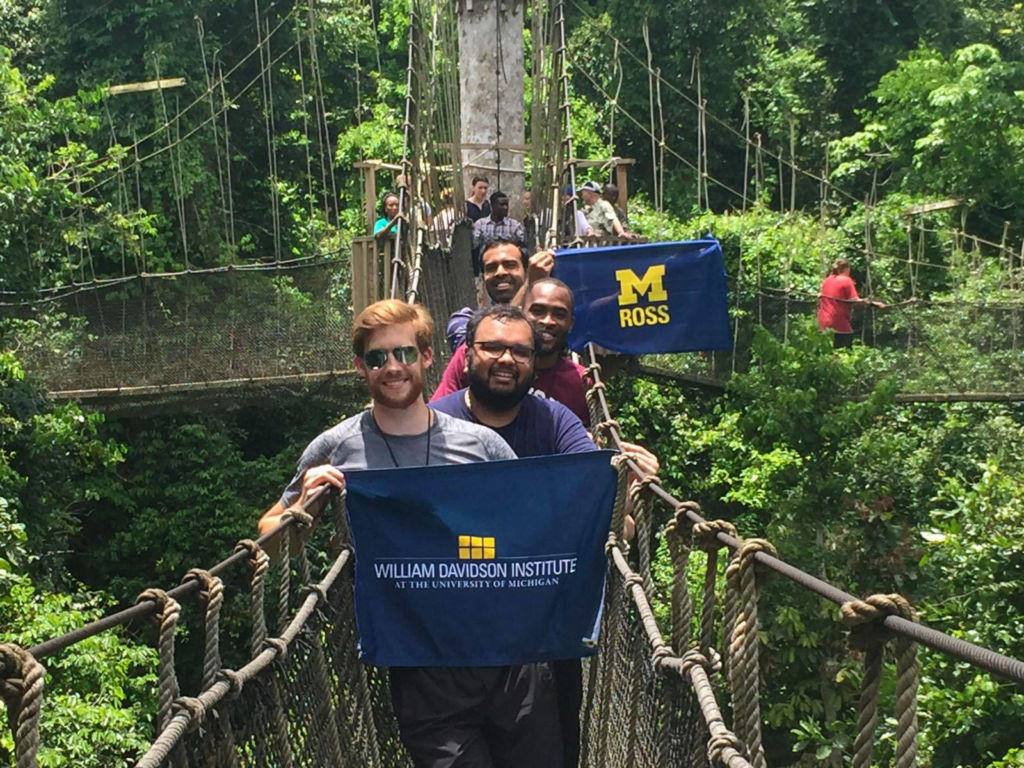
A 2018 WDI MAP team in Ghana.
Carrie Boyle, a MBA student at Michigan’s Ross School of Business, hopes to work in philanthropy somewhere in the U.S. after graduation. But for a couple of weeks in March, she is excited to be traveling to India as part of the school’s annual Multidisciplinary Action Projects (MAP).
“Working in another country is something I may never get the chance to do again,” she said. “This will be my first time in India and the country really interests me.”
Boyle and her teammates will work with Michigan Academy for the Development of Entrepreneurs (MADE), a nonprofit institute established at Ross by the Zell Lurie Institute for Entrepreneurial Studies, in partnership with WDI and Aparajitha Foundations. MADE works with entrepreneurship development organizations in India to help entrepreneurs operating small- and medium-sized enterprises (SMEs) succeed.
Boyle said she had some criteria when looking for MAPs that interested her.
“I wanted an opportunity to be on the ground having meaningful conversations with the people most immediately impacted by SMEs,” she said. “SMEs employ so many people and impact so many lives.”
Her teammate Shoko Wadano said she too is interested in working with SMEs, “which are very common in India.”
“I’m interested in how businesses mature in India,” she said. “I want to learn what pressures and impacts SMEs have in common, and what kind of value we can bring to them.”
WDI is sponsoring the MADE MAP project along with 10 others this year. MAP is an action-based learning course in which MBA students receive guidance from faculty advisors from WDI and Ross. Each project requires analytical rigor, critical thinking and teamwork. (Find out more about WDI’s MAP projects over the years here.)
After learning about their projects and conducting secondary research for several weeks, the student teams spend two to four weeks working with their organizations in the field.

David Butz
“The complementarities between the talents our students bring and what our sponsors need are sublime,” said David Butz, a WDI senior research fellow in the Healthcare sector who is an advisor on two projects. “Our students experience impact in brand new ways. Our sponsors learn, too, how disciplined management methods can yield dramatic innovations.”
Butz said he enjoys working with the student teams on MAP because it “poses such a unique challenge for both the students and their sponsor organizations, and forces us all to think big.”
“For me, the best achievements are tangible, direct and narrow but at the same time big and high-impact,” he said. “In our short time, can we help to break some key bottleneck, expedite a critical process pathway or otherwise liberate resources and expand capacity? Is the innovation scalable or replicable elsewhere? Do the students and organizations thereby feel empowered?”
Here is a summary of each WDI-sponsored MAP project:
Aravind Eye Care System – India
MAP Team: Rohan Dash, Sid Mahajan, Aman Rangan, Nik Royce
Aravind Eye Care System (AECS) is a vast network of hospitals, clinics, community outreach efforts, factories, and research and training institutes in south India that has treated more than 32 million patients and has performed 4 million surgeries since its 1976 founding.
AECS opened a tertiary eye care center in Chennai in September 2017 that will ultimately serve more patients than any other facility in the AECS system. The MAP team will formulate a detailed three-year strategic plan for Aravind Eye Hospital in Chennai.
CURE International, Inc. – Kenya, Ethiopia, Zambia, Uganda
MAP Team: Dominique James, Sarah Raney, Hannah Viertel, Olga Vilner Gor
CURE operates clubfoot clinics in 17 countries around the world, each tasked with helping children and families deal with the congenital deformity that twists the foot, making it difficult or impossible to walk.
For CURE, the student team will develop a strategic evaluation framework to assess opportunities for market entry and expansion building on global data.
Ghana Emergency Medicine Collaborative – Ghana
MAP Team: Benjamin Desmond, Benjamin Quam, Nicholas Springmann, Vishnu Suresh
The Ghana Emergency Medicine Collaborative aims to improve emergency medical care in Ghana through innovative and sustainable training programs for physician, nursing and medical students. The goal of the training programs is to increase the number of qualified emergency health care workers retained over time in areas where they are most needed.
The MBA team will formulate a detailed strategy to implement interoperable digital payment systems in Ghanian hospital emergency departments.
India Investment Fund – India
The India Investment Fund is working to become the first international, student-run fund at the Ross School of Business. Ross MBA students would be responsible for investing, managing and growing a real investment portfolio.
MAP Team: Charlie Manzoni, Patrick Riley, Queenie Shan, Sheetal Singh
The student team will conduct due diligence on Indian small- and medium-sized enterprises to assess viability for investments, and an appropriate financing instrument.
Infra Group – Ethiopia
MAP Team: Rin Chou, Chandler Greene, Yuki Ito, Brittany Minor
Infra Group is diversified international group with business units in financial services, industries and infrastructure development. Infra Group helps build a more prosperous society through global-scale business development with integrity as its top priority.
The MAP team will conduct due diligence on a group of small- and medium-sized enterprises (SMEs), and recommend which ones to invest in and what amount to invest.
Lviv Business School & Ukranian Catholic University – Ukraine
MAP Team: Blake Cao, Emily Fletcher, Kelsey Pace, Adam Sitts
Lviv Business School and Ukranian Catholic University is a private educational and research institution in western Ukraine.
The student team will undertake a needs assessment of the small- and medium-sized enterprises (SMEs) to determine if Lviv Business School should begin offering consulting services to these SMEs and if so, how those should be structured.
MADE – Poornatha/Aparajitha Foundations – India
MAP Team: Carrie Boyle, Lawrence Chen, Dillon Cory, Shoko Wadano
Michigan Academy for the Development of Entrepreneurs (MADE) is a nonprofit institute established at the Ross School of Business by the Zell Lurie Institute for Entrepreneurial Studies, in partnership with WDI and Aparajitha Foundations. MADE works with entrepreneurship development organizations in developing countries to give individuals operating businesses in these environments the knowledge and best practices they need to thrive.
The MAP team will develop an expansion plan for MADE in the southern Indian state of Tamil Nadu.
The Ihangane Project – Rwanda
MAP Team: Lauren Baum, Nadia Kapper, Paul Mancheski, Jason Yu
The Ihangane Project (TIP) empowers local communities to develop sustainable, effective, and patient-centered health care delivery systems that holistically respond to the needs of vulnerable populations. Partnering with Ruli District Hospital and its associated health centers, TIP is working to identify key strategies for improving health outcomes.
The student team will develop a business model to grow the ready-to-use therapeutic food that is used to treat severe, acute malnutrition.
WEEKEND MBA MAP PROJECTS
Awash Bank – Ethiopia
MAP Team: Matthew Campbell, Joshua Dodson, Joseph McCarty, Aman Suri
Awash Bank, a private, commercial bank, was established in 1995 and features more than 375 branches across the country.
The MAP team will develop a product that can provide capital to small- and medium-sized enterprises (SMEs) in Ethiopia by utilizing remittances already being sent back to that country. The students will work with the bank on all aspects of the loan product. They also will give the bank recommendations on how to monitor the loan and provide business support to SMEs that borrow from the fund.
Grace Care Center – Sri Lanka
MAP Team: Daniel Cady, Yizhou Jiang, Gerardo Martinez, Daniel Murray
The Grace Care Center (GCC) is a home to about 70 orphaned children that offers daycare services and vocational training. It also is home to several poor and displaced seniors, many of whom have chronic health issues such as hypertension and diabetes.
Past MAP student teams from the Ross School of Business developed a diabetic care center model for GCC. This year’s student team will examine the current model and make any needed updates and revisions.
International Clinical Labs – Ethiopia
MAP Team: Emily Mascarenas, Torre Palermino, Alexander Santini, Matthew Traitses
ICL was established in 2004 to provide quality laboratory service all over Ethiopia. ICL serves more than 240 health care centers throughout the country, and is expanding its service throughout Ethiopia.
The Ethiopian government is building its first medical waste incinerator facility outside the capital city of Addis Ababa and has committed to building seven more around the country. WDI is assisting a group of business managers with business plan advice who are interested in managing the business aspects of operating the incinerators. The MAP team will develop a proposal to be presented to the government later this year for the business managers to operate the incinerators.
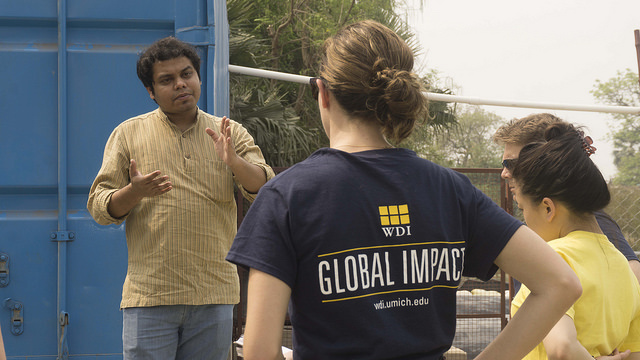
From a 2017 WDI-sponsored MAP team.
WDI’s partnership with Aravind Eye Care System dates back to 1999. Over the years, the organization has utilized a combination of student MBA teams and other engagements with the Institute to explore new ideas for growing strategically and improving operations at its hospitals and clinics, which offer world-class eye care at affordable prices.
Just a few of those completed projects include determining the appropriate governance structures for Aravind, consulting on expanding geographically and growing eye care services, implementing improved operational processes, delivering HR capabilities and leadership training for physicians, and improving the culture and patient experiences. Each of those projects were sponsored by WDI as part of the Ross School of Business’s annual Multidisciplinary Action Projects (MAP).
In 2016, a student team customized and tested an existing process model at select Aravind facilities that measured performance of each unit in terms that everyone in the organization could understand. Last year, the Aravind MAP team worked with senior leadership to develop a roadmap for the eyecare system’s future growth.
MAP is an action-based learning course offered at Ross in which MBA students receive guidance from faculty advisors. Each project requires analytical rigor, critical thinking, and teamwork. (Find out more about WDI’s MAP projects over the years here.)
After learning about their projects and conducting secondary research for several weeks, the students spend two to four weeks working with their organizations in the field.
In March, a MAP team (one of nine sponsored by WDI) will travel to Chennai, India to work at Aravind’s largest facility, which opened in September 2017 and offers the usual suite of services to patients, including specialty eye surgeries. As the new facility nears its six-month anniversary, administrators are studying patient care and looking for areas of improvement.
The students, as part of their overall work to enhance the patient experience, will work with Aravind leadership to develop recommendations on how to transition some of the work performed by eye specialists to general ophthalmologists, who are currently underutilized. Before heading to Chennai on March 17, the team will meet with faculty at the University of Michigan’s Kellogg Eye Center to hear how they manage similar issues.
Members of the MAP team said they are eager to observe the Aravind business model, which student Gerard Heath called “a leader around the world in developing solutions to provide high quality care in low-resource environments.” They all think the experience and work at Aravind will help them in the classroom as they finish up their studies, and may help inform their future career paths.
Kelsey Wyatt-Mair said she is interested in operations and “learning from this hands-on experience will equip me for later in my career, whether it’s in or out of healthcare.”
And Katie Zurales is “excited to see a different healthcare system” and how high quality, cost-effective healthcare “translates to different cultures.”
Of the four team members, which also includes Daniel Semaan, only Wyatt-Mair has some international work experience.
“It will be interesting for all of us – how to navigate that culture,” Wyatt-Mair said. “We’ll get exposed to the similarities and differences of Aravind with, say, Kellogg Eye Center.”
In between the work, the group plans to explore some local temples and beaches and perhaps travel to other cities. They said they were excited to discover Chennai was listed as one of the world’s best “food cities.”
WDI Initiatives often recruit partner organizations to work with MAP teams. The Aravind project is aligned with the Institute’s Healthcare Initiative. Similarly, WDI’s Education Initiative is working with the MAP team assigned to the Technological Institute of the Philippines (TIP) project. The students will create a strategic plan for a newer TIP initiative to improve the engineering and technology skills of students.
Amy Gillett, vice president of WDI’s Education Initiative, said MAP teams are one of the ways the initiative can improve the delivery of management education in emerging markets.
“The MAP teams bring new perspectives to universities in emerging markets,” she said. “They help university leadership think in different ways about how to expand into promising new areas or how to think strategically about growing an existing department or initiative. We’re so pleased to have this opportunity to unite MBA students – with their passion for social impact and their strategic thinking – with our university partners who welcome fresh insights.”
Like many of the Institute’s MAP partners, TIP has collaborated with WDI in the past. TIP was one of three university partners that worked with WDI on the STRIDE project.
“We’re so pleased to continue our successful partnership with TIP,” Gillett said. “During a recent trip to Manila, I had the opportunity to meet with TIP’s leadership. I was really impressed by their commitment to providing access to a college education for underserved communities as well as by their drive to continuously improve their operations and the services they offer to students.”
Here is a summary of each WDI-sponsored MAP project:
Aparajitha Foundations – India
Advisors: Paul Clyde, WDI and Ross School of Business; Stewart Thornhill, Zell Lurie Institute for Entrepreneurial Studies and Ross School of Business
MAP Team: Amirah Patterson, Riki Smolen, Robert Mack, Nathan Stevens
Aparajitha Foundations is a charitable trust that supports the less privileged, mainly in the areas of education and health.
The team will co-create alongside the founding team of the Michigan Academy for the Development of Entrepreneurs (MADE) as they test, validate, and iterate on MADE’s business model and product prototype for supporting entrepreneurs and Small Medium Enterprises (SMEs) in Madurai, India. MADE is a nonprofit institute established at the Ross School of Business by the Zell Lurie Institute for Entrepreneurial Studies, in partnership with WDI and Aparajitha Foundations, that works with entrepreneurship development organizations in developing countries to give individuals operating businesses in these environments the knowledge and best practices they need to thrive.
Aravind Eye Care System – India
Advisors: Paul Clyde, WDI and Ross School of Business; Jim Walsh, Ross School of Business
MAP Team: Gerard Heath, Katie Zurales, Daniel Semaan, Kelsey Wyatt-Mair
Aravind Eye Care System is a vast network of hospitals, clinics, community outreach efforts, factories, and research and training institutes in south India that has treated more than 32 million patients and has performed 4 million surgeries since its 1976 founding.
The MAP team will develop a framework for integrated patient care service delivery.
CURE International – Ethiopia
Advisors: Paul Clyde, WDI and Ross School of Business
MAP Team: Simon Kaufmann, Keegan McQuillan, Alan Wisniewski, Brandon Yelen
CURE operates clubfoot clinics in 17 countries around the world, each tasked with helping children and families deal with the congenital deformity that twists the foot, making it difficult or impossible to walk. In Ethiopia, CURE manages 37 clinics.
The MAP team will work to improve quality and increase scale of leg brace production in Ethiopia.
Ghana Emergency Medicine Collaborative – Ghana
Advisors: David Butz, WDI and Ross School of Business; Jim Walsh, Ross School of Business
MAP Team: Alexander Ukoh, Liam Kraft, Kartik Raju, Shreyance Mandaliya
The Ghana Emergency Medicine Collaborative aims to improve emergency medical care in Ghana through innovative and sustainable training programs for physician, nursing and medical students. The goal of the training programs is to increase the number of qualified emergency health care workers retained over time in areas where they are most needed.
The student team will investigate the feasibility of incorporating mobile payments into the emergency department workflow, including an analysis of how that will impact both the finances and operations of the department.
Imperial Logistics – South Africa
Advisors: David Butz, WDI and Ross School of Business; Ravi Anupindi, Ross School of Business
MAP Team: Justin Loescher, Jasmine Knowles, Courtney Alexander, Javier Castillo
Imperial Logistics provides logistics and supply-chain management across the African continent, and is a leading distributor of medicines and healthcare products.
The MAP team will establish an African Pharmaceutical Wholesaler Association (APWA).
Outbound Initiative – Brazil
Advisors: Paul Clyde, WDI and Ross School of Business; Stewart Thornhill, Zell Lurie Institute for Entrepreneurial Studies and Ross School of Business
MAP Team: Tsering Sherpa, Daniel Vergara Ramirez, Dale Jarosz, Varun Haralalka, Agustin Sosa, Mike Porcelli
Outbound Brasil uses the latest technology to identify global opportunities and resources for the growth of innovative and high impact business in that country, such as new and better markets, customers, partnerships, investments and awards.
The team will conduct a situation analysis on the Brazilian tech investment scenario and make recommendations for which innovations could make smart money more accessible to local startups.
REFRESCH – Gabon
Advisors: Paul Clyde, WDI and Ross School of Business; Bob Dittmar, Ross School of Business
MAP Team: Alena Golovchenko, Felipe Prieto Nunez, Sean Welsh, Allie Murphy
REFRESCH (Researching Fresh Solutions to the Energy/Water/Food Challenge in Resource Constrained Environments), is a consortium of educators and researchers working to improve the lives of those living in resource-constrained communities. Its goal is to find solutions to challenges in the areas of food, water and energy. It is funded by the University of Michigan Third Century Initiative and is headquartered at the University of Michigan Energy Institute.
The student team will identify a set of commercially viable business model archetypes or templates to increase access to renewable energy products and services in Gabon. They also will develop a recommendation on the most likely template to be profitable. A secondary goal is to understand the entrepreneurial skills and capabilities required to launch and operate such enterprises.
Technological Institute of the Philippines (TIP) – Philippines
Advisor: Paul Clyde, WDI and Ross School of Business
MAP Team: Joseph Grandominico, James Schoen, Alexa Thomas, Charlton Washington.
The Technological Institute of the Philippines (T.I.P.) is a leading private tertiary education institution that specializes in engineering and technology courses, and has an enrollment of 25,000 students on campuses in Manila and Quezon City. In 2016, the school launched T.I.P. TechnoCoRe, which aims to develop engineering and technology students’ skills in problem-business opportunity formulation, ideation, validation and execution – the core skills of technopreneurship.
The student team will create a strategic plan for T.I.P. TechnoCoRe.
Vayu Inc – Senegal
Advisor: Paul Clyde, WDI and Ross School of Business
MAP Team: Alexander Franczyk, Brandon Pickett, Adam Ronk, Adam Woodruff.
Vayu has developed an unmanned aerial vehicle (UAV) that can be used to deliver needed medical supplies and products to remote areas. The UAV launches and lands like a helicopter and flies like an airplane once off the ground. It can fly 100 kilometers and hold just over two kilograms of payload.
The team will conduct market analysis and develop an entry strategy for introducing delivery UAVs into Senegal’s market.
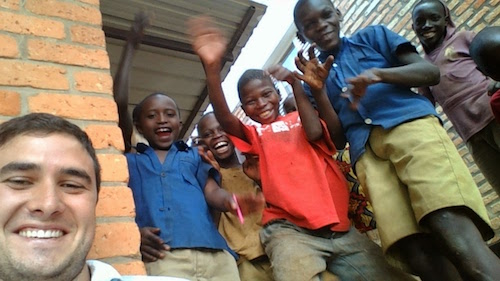
2015 WDI summer intern Julio Villasenor poses with some Rwandan children. This summer, WDI continues its long partnership with The Ihangane Project at Ruli District Hospital in Rwanda by sending summer intern Nana Asare there for a project.
Six University of Michigan students representing four schools and colleges will spend the summer abroad working as WDI Global Impact Fellows, tasked with formulating a strategic plan, streamlining supply chains, evaluating program impacts, empowering entrepreneurship, developing financial models, and creating a new business model.
The students represent the Ross School of Business, the Ford School of Public Policy, the School of Natural Resources and Environment (SNRE), and Health Informatics, a joint program of the School of Information and the School of Public Health. They will work in Ethiopia, Ghana, India, Kenya, Mexico, Rwanda, and Sri Lanka, and support the work of WDI initiatives in Healthcare, Performance Measurement, and Scaling Impact.
Five of the six summer internship projects were developed by WDI along with its partners. Two organizations – Grace Care Center and the Ihangane Project – are longtime partners with WDI and have sponsored student projects, both internships and Multidisciplinary Action Projects (MAPs), for several years. The work done by the summer interns at these organizations is building on previous projects performed by MAP teams, students in a travel-study course and previous interns all sponsored by WDI.
WDI also supports graduate students who source their own internship projects based on their educational, personal, and career interests provided that the work fall within one of the Institute’s research focus areas. One intern this year, Julia Entwistle, worked with the leadership at ADHENO, a non-profit focused on extreme poverty in Ethiopia, to define the scope of work for her project, then submitted a proposal to WDI for funding.
Entwistle has worked with WDI’s Performance Measurement Initiative (PMI) as she prepares to evaluate the impact of ADHENO’s environmental restoration and economic empowerment programs that operate in the Northern Shewa province of Ethiopia. PMI provided multiple rounds of feedback on the survey Entwistle has developed to conduct the impact assessment this summer.
“PMI hopes that the project will lead to new measurement-related learnings, especially related to environmental metrics and assessment,” said Heather Esper, senior program manager of the initiative. “PMI also is hopeful this work may lead to possible future collaborations with the organizations involved, including SNRE faculty.”
Here are the interns and their projects:
Nana Asare
Ruli, Rwanda
The Ihangane Project (TIP) empowers local communities to develop sustainable, effective, and patient-centered health care delivery systems that holistically respond to the needs of vulnerable populations. Partnering with Ruli District Hospital and its associated health centers, TIP is working to identify key strategies for improving health outcomes.
Since 2009, TIP has worked with WDI and the Ross School of Business to find ways to improve Ruli’s communication flow, cost-effectiveness, and financial sustainability. In winter 2016, Ross students worked with Ruli and TIP to develop a problem-solving framework designed to encourage hospital staff to proactively address challenges at the hospital. The students also created a curriculum and agenda for presenting this framework to staff members during a hospital retreat. That summer, a WDI summer intern helped Ruli and TIP successfully conduct the retreat.
Ruli has now turned its attention to formulating a strategic plan that reflects the priorities of the hospital and community, while also addressing the requirements of the Rwanda Ministry of Health. This past winter, Ross students created a framework for a hospital staff to use in developing a strategic plan during a retreat.
Asare will support the hospital staff to ensure a successful summer retreat. He also will help implement recommendations developed at the retreat, create a roadmap that can build upon the strategic plan developed at the retreat that will guide future projects, and evaluate the effectiveness of the retreat.
Karen Cuenca
Ford School of Public Policy
Mexico City, Mexico
Value for Women (VFW) is a UK-based social enterprise operating in Latin America, Africa, and Asia that works with partners to improve gender and social inclusion. Their specialists provide tailored technical assistance and capacity-building expertise to impact investors, banks, multinational companies, and NGOs, to deepen the inclusion dimension of their business models, value chains, programs, and products and services.
With supply chains in the agriculture sector increasingly under strain, the inclusion of women is critical, and smallholder farmer associations and small- and medium-sized enterprises (SMEs) have an opportunity to strengthen their role as suppliers to corporate entities.
Cuenca will conduct a situational analysis to understand and assess the current position of women in agriculture supply chains in Mexico, and recommend opportunities for improving gender inclusion in agriculture organizations and supply chains in Mexico.
Ann Duong
Becton, Dickinson and Company (BD)
Nairobi, Kenya and Addis Ababa, Ethiopia
Bangalore, India
Becton, Dickinson and Company (BD) is a global medical technology company working to improve medical discovery, diagnostics, and the delivery of care. BD actively engages with the U.S. President’s Emergency Plan for AIDS Relief (PEPFAR) to improve overall laboratory systems and services in African countries severely affected by HIV/AIDS and TB. This initiative is a public-private partnership with the U.S. Centers for Disease Control and the Ministries of Health in Ethiopia, Kenya, Mozambique, and Uganda.
Through both field-based and domestic work, Duong will be supporting implementation of the technical impact evaluation of the BD-PEPFAR program, Labs For Life: Strengthening Laboratory Systems in Developing Countries.
Following this project, Duong will travel to Bangalore, India for a short project with iSPIRT, a software product think tank that has been working with numerous start-ups in the development of IndiaStack. IndiaStack is an exciting set of technologies governments, businesses, and others utilize a digital infrastructure, creating a paperless and cashless service delivery model that is being integrated into India’s economy.
Duong will work with iSPIRT to connect and study various companies and start-ups that are utilizing IndiaStack’s APIs. After returning to Michigan, she will analyze this information in order to generate key insights into how stack technology can be used to enhance healthcare access and delivery.
Julia Entwistle
School of Natural Resources and Environment
Addis Ababa and Debre Berhan, Ethiopia
ADHENO implements various environmental restoration programs such as tree planting to slow the desertification process, soil protection measures such as terracing, and improving agricultural resilience through irrigation, water conservation, and crop diversification, to combat environmental degradation that negatively impacts agricultural productivity and revenue in Ethiopia. The organization also operates economic empowerment projects to support microenterprises such as beekeeping, animal rearing, basket weaving, and traditional spice processing to diversify the economy and include women in the workforce.
Entwistle will conduct an impact evaluation of ADHENO’s environmental restoration and economic empowerment programs that operate in the Northern Shewa province of Ethiopia. The organization wants a comprehensive evaluation of its work before rolling out the programs to more rural sub-districts in Ethiopia.
Danielle Wilkins
School of Natural Resources and Environment
Trincomalee, Sri Lanka
The Grace Care Center (GCC) is a home to about 70 orphaned children that offers daycare services and vocational training. It also is home to several poor and displaced seniors, many of whom have chronic health issues such as hypertension and diabetes.
Based on past work by MBA student teams from the Ross School of Business, GCC developed a diabetic care center model. Trained para professionals acquire data relevant to diabetes, which are sent to the University of Michigan to be tabulated and analyzed to segregate patients into risk categories. The medical data from 100 diabetes patients have been monitored and analyzed for the past five months.
A long-term, sustainable economic model needs to be developed and then subjected to a pilot test to ensure that the model has taken into account all the parameters. The end goal is a successful economic model that could be replicated in other parts of the country.
Wilkins will build upon the past work of her fellow U-M students to identify and develop a pricing strategy, build an economic model (subscription vs. government funded), and set up the pilot to test the chosen model.
Tim Yuan
Department of Mechanical Engineering, University of Michigan
Kumasi, Ghana
One of the applied projects in the Department of Mechanical Engineering’s lab is a solar e-trailer in collaboration with Pratt and Miller Engineering. The overarching goal is to demonstrate that transportation services enabled by affordable, low-speed, solar-powered electric vehicles (EVs) can improve the quality of life of the residents in the villages in Africa and the other developing countries. In 2016, a working prototype of a solar bicycle e-trailer was developed along with a preliminary business model.
Yuan will develop a market-entry strategy for the integrated transportation, electricity charging, and usage data collection services provided by solar bicycle e-Trailers (or similar small-sized solar EVs). He also will build a sustainable business model for manufacturing, distributing, and leasing such vehicles in villages and cities in Ghana.
Each summer, as part of its mission to provide high-quality learning opportunities to University of Michigan students, WDI sponsors interns who work overseas with international organizations.
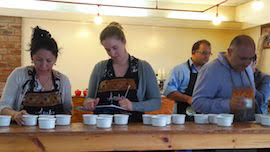
This year, five U-M graduate students representing five different schools across campus are working in the education, healthcare and poverty alleviation fields. The projects are based in Ghana, Rwanda, Ethiopia, India, Peru and the Philippines.
In addition to providing the students with meaningful business and cultural experience that comes with working internationally, the summer internships also provide WDI’s five initiatives with important insights from the field. This summer’s internships are managed in collaboration with WDI’s Performance Measurement Initiative (PMI), Education Initiative, and Healthcare Initiative.
“The PMI team is excited to provide measurement advice and support to WDI’s interns, learn from their related experiences, and apply those learnings to current and future projects,” said PMI Program Manager Heather Esper. “In particular, we are interested in learning more from the Pearson Affordable Learning Fund/ Affordable Private Education Centres internship in the Philippines. (Learn more about these projects below). Implementing and institutionalizing a new measurement system centered on learning, and conducting demand analyses and customer segmentation are both areas of great interest to our partners.”
Here are the interns and their projects.
Naomi Wilson, School of Education
Organization: Pearson Affordable Learning Fund (PALF) in partnership with Omega Schools
Country: Ghana
PALF makes minority equity investments in for-profit companies to meet the growing demand for affordable education across emerging market countries. Their vision is to help millions of children in the world access a quality education in a cost effective, profitable and scalable manner. Additionally, organization wants to demonstrate to governments and donors that private education can help to educate their youngest citizens in an efficient way.
Omega Schools is a chain of affordable schools in Ghana delivering quality education affordably to 15,000 low-income students.
As Omega continues its growth, it needs a structured, evidence-based, and easy-to-use software tool for selecting new school sites and determining what price point would be appropriate for specific locations. Wilson will research similar tools already in place, analyze enrollment and profitability of current schools, visit current and potential school site and identify key factors to be considered in site selection.
Michael Manansala, Ford School of Public Policy
Organization: PALF in partnership with Affordable Private Education Centres (APEC)
Country: The Philippines
APEC is a chain of affordable, high-quality secondary schools based in metro Manila focused on employability and life skills.
Manansala will aim to improve annual student assessment and quarterly academic reporting by analyzing existing student performance data and benchmarking it against publicly available data to determine learning outcomes. He also will review existing research and conduct a series of qualitative customer interviews and quantitative customer surveys to better understand why some parents send their children to APEC while others don’t.
Carissa De Young, Ross School of Business/School of Natural Resources and Environment
Organization: Shared-X
Country: Peru
Shared-X is a for-profit, startup social impact business in its first year of operation. It works to lift thousands of farmers out of extreme poverty by deploying advanced farming techniques on highly productive land to close the agricultural yield gap between developed and developing nations. Through the direct sale of specialty crops to international markets, Shared-X provides social, environmental, and economic benefits to local farming communities and generates strong returns for shareholders. Shared-X operates test farms that demonstrate best farming practices and secure contracts for its crops. It then expands access to its technology and markets to smallholder farmers in surrounding communities.
De Young will design a strategy to measure, communicate, and expand the social impact of Shared-X’s model of engagement with smallholder farmers. She will identify and measure impact by conducting interviews with stakeholders and experts ranging from current and potential future cooperative members, Shared-X personnel, and leaders in similar companies. She will then compare her findings with industry best practices to create a proposal for key performance indicators.
De Young also will identify a pathway to continue replicating the Shared-X model with additional smallholder farmers in other regions where Shared-X farms exist.
Elisabeth Michel, School of Public Health
Organization: The Ihangane Project (TIP)
Country: Rwanda
TIP empowers local communities to develop sustainable, effective, and patient-centered health care delivery systems that holistically respond to the needs of vulnerable populations. It envisions a world in which quality health care leads to healthy, inclusive, and empowered communities. TIP has been working with Ruli District Hospital in Rwanda and its seven associated health centers to determine key strategies for improving health outcomes within the community.
Michel will facilitate a successful hospital retreat that creates a shared vision of high-quality and patient-centered health care at Ruli, and includes an implementable framework for decision-making and problem solving. She also will help the hospital staff implement recommendations that come from the retreat.
Dilparinder Singh, Ross School of Business
Organization: PATH
Countries: India and Ethiopia
PATH is a Seattle-based international, nonprofit health organization that creates sustainable, culturally relevant solutions, enabling communities worldwide to break long-standing cycles of poor health. PATH is one of many global health organizations working with countries to reduce malaria deaths.
Singh will work with PATH to conduct a market landscape of current malaria testing and treatment algorithms in Ethiopia. He also will work with PATH’s India Innovation Hub, which encourages innovative approaches to healthcare.